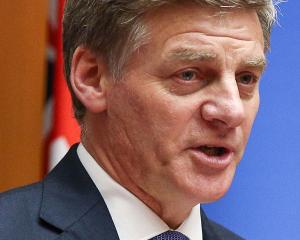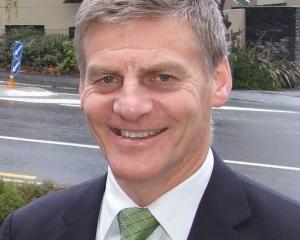
Mr Shearer had been elected leader a week earlier.
Mr Key offered his congratulations and Shearer asked him if he had any advice.
Mr Key advised him to seize the moment early in his leadership to make changes he really wanted pushed through.
Mr Shearer is unlikely to take Mr Key's advice.
Labour may have elected a leader who, like Mr Key, is hard not to like, but Mr Shearer will be quite a different kind of leader.
Mr Shearer is in no rush.
He will be bold when he is good and ready to be bold.
As one Labour MP likes to characterise it, the track to government is not a sprint.
It's not a marathon either. It's more like a 1500m race.
The Ports of Auckland dispute gives some clue about what to expect of the Shearer leadership.
The baying from the left and goading from the right to support the union in the dispute has been met with silence from him.
Darien Fenton has expressed general concerns about casualisation of work at the port, but the party has backed away from the view the union must be defended to the death in every union dispute with business.
Phil Twyford may be close to Mr Shearer's view when he floated the notion on National Radio this week that there may be too many ports in the north of the North Island and greater rationalisation might not be a bad thing.
Mr Shearer won't be responding to every issue just because he is asked, in the way that Mr Key does and Phil Goff did.
For a start he is not politically dexterous enough. And having so little experience, he doesn't have the institutional knowledge of the party or politics generally.
His political compass will be grounded more in values than old Labour traditions.
He will more positive generally. He will not automatically oppose. He will be measured.
The party will take its time to respond to the charter schools policy, for example.
Mr Key's advice to Mr Shearer to push through policy early was based on his own experience. Mr Key did it at one of his earliest Cabinet meeting in 2009 over the restoration of titular honours with no particular support from colleagues.
He clearly didn't know at the time that his honeymoon would last a full three years and he could have used his political capital at any point.
The fact is, even if Mr Shearer was tempted to follow Mr Key's advice, the party would not let him get away with issuing policy diktats or repudiating policy he thought was wrong.
The open leadership contest in which Mr Shearer and David Cunliffe addressed party meetings is likely to have changed the expectation of the membership.
They will expect more of that as the party heads into review mode, not less.
The party is still a little brittle after the contest.
An ageing surfer Mr Shearer may be, but he is not yet riding a wave of political support, either with the public or within the party, that would allow him to make policy by decree.
The Roy Morgan poll this week, the first since the election, shows no change in Labour's polling at 27.5%.
The first formal party event of the year is taking place this weekend but it is of a more futuristic and optimistic mode.
The annual Labour Youth summer school near Orere Point will be taking place, where among other things they will decide what legacy they would like a sixth Labour government to have, presumably a Shearer-led sixth Labour government.
Next week at a caucus retreat in Taupo, some retrospection will begin.
There is policy to be reviewed but again, there is no rush. Next week they will look at how that process will run.
There is no shortage of policies for potential repudiation: the capital gains tax, raising the age of superannuation to 67, compulsory KiwiSaver and extending the in-work family tax credit to beneficiaries with children.
Of those, the capital gains tax policy is the least likely to go: it was thoroughly researched and announced and explained well in advance of the election.
But raising the age of superannuation from 65 to 67 gradually and making KiwiSaver compulsory is another story.
Will the party continue to promote policy on the basis of principle that may lose it votes?
Or does it take a more pragmatic approach?
Well, the pragmatists won the leadership contest. And that inevitably points towards the centre. But nothing will be done in a rush.




